10+ SAMPLE Clinical Research Project Plan
-
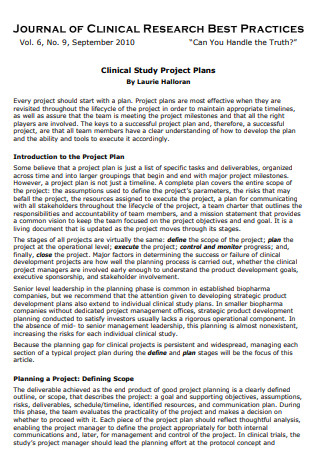
Clinical Research Project Plan
download now -
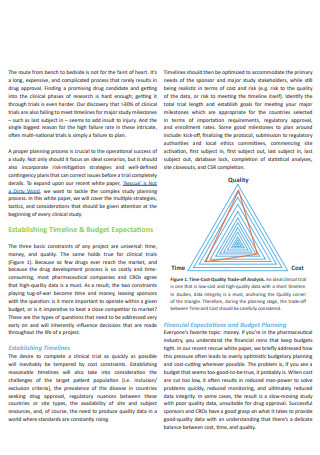
Successful Clinical Research Project Plan
download now -
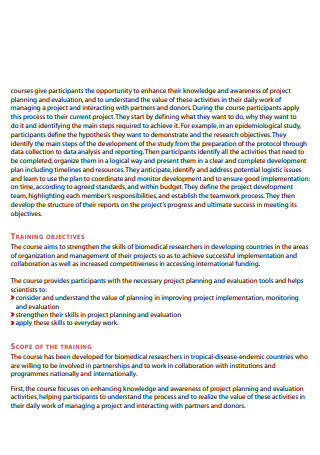
Clinical Research Project Plan & Evaluation
download now -
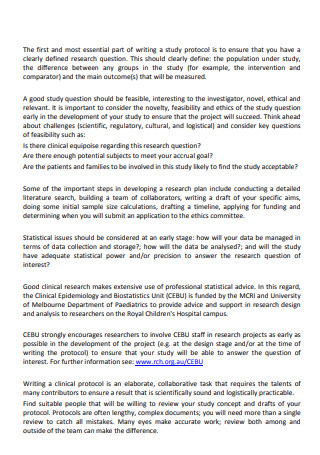
Clinical Research Project Development Plan
download now -
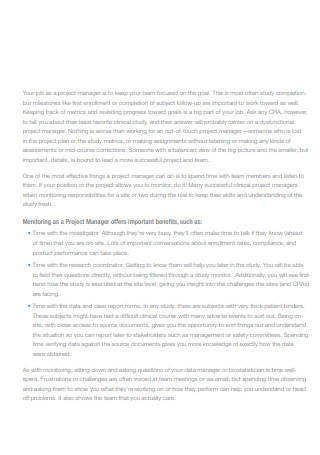
Clinical Research Project Plan Fundamentals
download now -
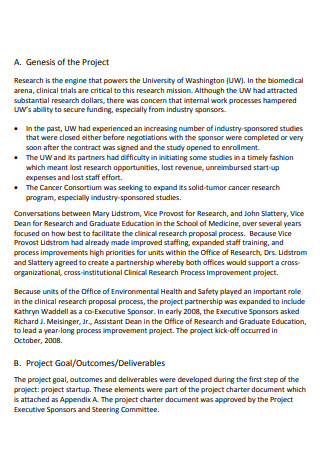
Clinical Research Project Improvement Plan
download now -
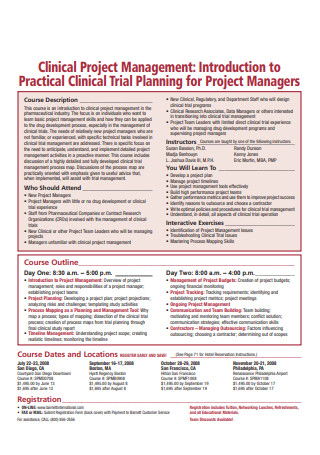
Practical Clinical Research Project Plan
download now -
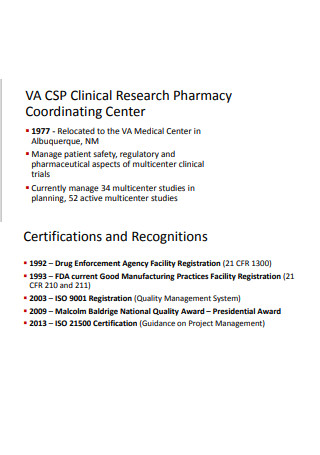
Clinical Research Project Plan Example
download now -
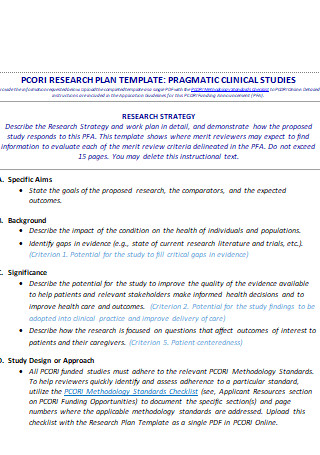
Clinical Studies Research Project Plan
download now -

General Clinical Research Project Plan
download now -
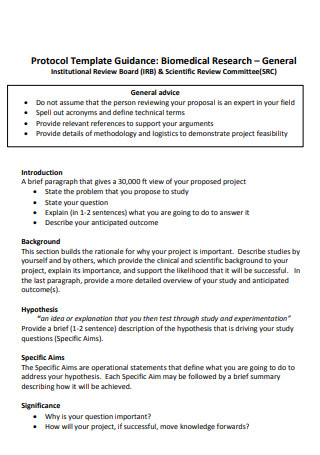
Standard Clinical Research Project Plan
download now
FREE Clinical Research Project Plan s to Download
10+ SAMPLE Clinical Research Project Plan
What is a Clinical Research Project Plan?
Different Types of Clinical Research Project Plans
Basic Components of a Clinical Research Project Plan
How to Write a Clinical Research Project Plan
FAQs
How to become a good clinical project manager?
What are the different types of clinical trials?
What are some examples of clinical research project plans?
How to manage and monitor a clinical research project plan?
What is a Clinical Research Project Plan?
A clinical research project plan is a comprehensive, and well-designed written document which is commonly used for the successful development of a specific clinical research project, medical research work, and/or other outputs of in-depth analysis and discovery in the medicine field. It is a management tool that presents the mission and vision of a medical business firm, a pharmaceutical company, a healthcare organization, or a team of clinical researchers especially when there’s a necessity for in-depth clinical research when there exists an occurrence of an unexpected spread of viral diseases or to prevent the growth of other health problems in our society.
This research project plan guides different individuals and professionals such as medical peers, science researchers, medical practitioners, potential clinical research collaborators, and many others in the clinical research industry to facilitate logical and systematic planning when achieving success in the clinical studies.
Due to the prolonged timelines and heavy costs associated with large clinical trials, many clinical researchers nowadays are starting to shift their focus on more efficient clinical trial management. Studies have shown that it is possible to dramatically reduce the total cost of a clinical trial by 60% – 90% without compromising the scientific validity of the results. Thus, all kinds of clinical researchers, medical researchers, biological researchers, clinical research project supervisors, and others should effectively create a compelling and well-detailed clinical research project plan.
Different Types of Clinical Research Project Plans
Effective project management in clinical trials and other clinical research projects refers to a standards-driven process that a project manager initiates and follows so that various clinical researchers are able to successfully manage a wide array of clinical trial sites, clinical research associates, and workflow through the utilization of tools or software in clinical trial management. Another thing you need to do is have a clear insight and understanding about the different types of clinical research project plans that you will use for your clinical research and development matters. Here we will explain to you about the different types of clinical research project plans:
1. Clinical Research Project Plan & Evaluation
Currently working on the planning and evaluation of a clinical research project? When preparing the plan and evaluation process, provide the significant details to help the participants of your research to improve their knowledge and awareness of project planning and evaluation and to comprehend the value and relevance of the activities in their daily work of managing a clinical research project while interacting with clinical research partners and donors. Identify what the clinical researchers and participants prefer to accomplish, why they want to accomplish it and determine the major steps required to finish the project. For the goals and objectives of the clinical research project, specify how the participants will understand the value of planning in improving project implementation, monitoring and evaluation, strengthen their skills in clinical project planning and evaluation, and apply these skills in their professional work. Include the scope of the clinical research project and describe the crucial information clearly. Organize the activities in a logical manner and present them in a complete development plan. It is important to learn effectively in using the plan so that you are able to coordinate and monitor the development of your clinical research project to ensure good implementation.
2. Clinical Research Project Development Plan
If you need to develop a clinical study protocol, it is important to write a cohesive clinical research project development plan to carefully structure key ideas, methods, strategies and techniques in the clinical study. Define the target population under study, the difference between any groups in the study and the major result(s) that will be measured. Identify the clinical study question which appears to be original, ethical and interesting to the clinical researcher. Make sure that the question has originality, ethics and feasibility early in the development of the clinical study so that your overall clinical research project will be successful. Prior to the development of the clinical study protocol, figure out the scientific, regulatory, cultural, and logistical challenges while considering these fundamental questions: Are there sufficient prospective subjects to reach your accrual goal? Are the patients and families to be involved in this clinical study likely to find the study acceptable? Then, you need to perform a comprehensive literature search, create a team of clinical research collaborators, prepare a draft of your specific goals, perform some initial sample size calculations, set a timeline and apply for funding.
3. Clinical Research Project Improvement Plan
Creating an improvement plan for a clinical research project is important to enhance the management and development of a clinical research and properly outline the goals, objectives, methods, evaluation, results, discussion, conclusion, and recommendations in the right way. Some research institutions and universities are struggling in securing the funding from industry sponsors as they experienced an increasing number of industry-sponsored studies that were closed either before the negotiations were done or very soon after the contract signing and the clinical study opened to enrollment. While other research institutions are experiencing challenges in initiating several clinical studies in a timely manner. If you need to secure funding and accomplish your clinical studies well, it is essential to check and analyze your current clinical research project plan and if you notice that you need to make some proper revisions, then it is the right indication that you should prepare a well-structured research project improvement plan.
4. COVID-19 Clinical Studies Research Project Plan
In August 2021, the World Health Organization (WHO) announced the next phase in its Solidarity trial being referred to as Solidarity PLUS as it will enroll hospitalized patients to test three new drugs in hospitalized COVID-19 patients. Artesunate, imatinib, and infliximab are the therapies that were chosen by an independent medical expert panel for their possible efficiency in decreasing the death risk in hospitalized COVID-19 patients. The Solidarity PLUS trial is a clinical platform trial which represents the largest global medical collaboration among WHO Member States as it involves thousands of researchers in over 600 hospitals in 52 countries, 16 more countries compared to the first phase of trials. Working on this clinical trial for COVID-19 is crucial to assess multiple treatments at the same time while using a single protocol, recruiting thousands of patients to produce strong estimates on the drug’s effect, and allowing new treatments to be incorporated and ineffective treatments to be excluded throughout the clinical trial course. Thus, clinical researchers working in COVID-19 clinical trials need a comprehensive clinical research project plan so that they are able to accomplish their research work in an organized manner.
Basic Components of a Clinical Research Project Plan
In this section, you will learn how to construct a well-written and systematic clinical research project plan. But you need to learn about the different kinds of components of a clinical research project plan. Include the following elements for you to create a professional piece of writing:
Include the research methodologies applied in the clinical research project. Justify the applied methodological approach. Then, list and justify the tools and resources that will be necessary in the clinical research project. Project Plan: Organize the breakdown structure of contents in the clinical research project. Classify the anticipated clinical research activities in phases and content blocks, as well as the dependencies between contents and the achievement indicators that can be done in certain time periods. Determine the dates in which the contents of the clinical research project are completed. Conclusion:After finishing the contents of the clinical research project plan, end your document with a concise concluding paragraph. Restate your clinical research topic. Develop a summary of the key points of your clinical research project. Then, connect the value or results of the major points of your clinical research project. References: Write well-detailed opinions and comments of the medical and scientific literature references, especially on the relevance of the medical references to the objectives of the research work. Cite the references that you applied for your overall clinical research project plan.
How to Write a Clinical Research Project Plan
There are many clinical trials that fail to deliver because of the absence of a structured, practical, businesslike approach to clinical trial management. Implementing and maintaining effective management systems and techniques in response to the needs of the clinical trial project exists as a major challenge for clinical researchers. That’s why clinical researchers, clinical project managers and medical experts need to establish effective project management systems in their clinical trials and align their research practices on the proper development and execution of a well-integrated clinical research project plan. Below are some easy-to-follow tips that indicate how to write a clear and structured clinical research project plan:
Step 1: Follow the General Advice
Before starting in developing your clinical research project plan, it is very important that you strictly follow the general advice and protocol while you work on your clinical research project. Do not expect that the person who will review your proposal and plan is a certified and licensed professional in your field. Spell out acronyms and identify the technical terms carefully. Then, provide relevant references to support your arguments, as well as the details of research methodology and logistics to present the feasibility of the clinical research project.
Step 2: Include the Introduction, Background, and Hypothesis
For the introduction, define the problem that you propose to study, state your research question, explain what you are going to accomplish or your goals to answer it through your clinical research project in 1-2 sentences. For the background, establish the rationale for why your clinical research project is essential. Take your time in describing clinical studies by yourself and by other researchers. Also, explain the significance of your project and support the likelihood that it will be achieved.
Step 3: Explain the Study Design or Approach
Your clinical research project should adhere to the relevant research institution methodology standards. Use the research methodology standards checklist being provided by your research management or institution so that your reviewers are able to quickly identify and assess the adherence to a specific standard. In this way, you are able to utilize the proper study design or research approach for your project.
Step 4: Develop a Summary
The next step is developing the summary of the clinical research project. Record and point out the key points of your clinical studies. Unveil the purpose, statistical techniques, analysis and evaluation process, clinical laboratory experiments, data collection, discussion and interim results. Present a system that will guide you in monitoring the phases which lead to the completion of the clinical research project.
Step 5: Set a Research Timeline
Set a research timeline to help guide the implementation of the clinical research project plan. Construct a clear and detailed time plan and reveal which clinical research work has to be done and when it will be accomplished. Include other responsibilities or obligations that must be performed in your clinical research project.
Step 6: Proofread and Prepare the Overall Plan
Review your overall clinical research project plan and make sure that you fully indicate all the major points in your plan. Emphasize the connection between the specific research goals, objectives, resources, strategies and methods used for reaching the objectives, and the evaluation of the clinical researchers involved in the clinical research project plan. If you realize that you forget some sections that need more important details, we highly recommend that you edit and revise the document as soon as possible.
FAQs
How to become a good clinical project manager?
A good clinical project manager possesses professional knowledge or experience with every functional area on a clinical research team. One should be capable of holding the responsibility and having a thorough understanding of how tasks are accomplished within each function.
What are the different types of clinical trials?
The different types of clinical trials are pilot studies and feasibility studies, prevention trials, screening trials, treatment trials, multi-arm multi-stage (MAMS) trials, cohort studies, case control studies and cross sectional studies.
What are some examples of clinical research project plans?
Some examples of clinical research project plans are clinical research project plan & evaluation, clinical research project development plan, clinical research project improvement plan, practical clinical research project plan, clinical studies research project plan, general clinical research project plan, and more.
How to manage and monitor a clinical research project plan?
If you are managing and monitoring a clinical research project plan, clearly set the research goals and objectives, examine indicators, clinical data collection methods, and clinical trial timeline, and look for the proper roles and responsibilities of key individuals in your clinical research and development team.
Clinical researchers and clinical project managers are the ones who make sure that the clinical trials are timely as they examine accurate data and generate precise results. They collaborate with the other clinical trial research and development team members to oversee the clinical research work within various stages. Writing a clear and well-integrated clinical research project plan is an integral method to carefully determine which specific tests to conduct and how frequently to administer them to reach scientific standards and government regulations while guiding the members of the clinical research team to be effective in gathering resources, selecting and enrolling subjects, managing data, avoiding bias, maintaining safety standards, monitoring the budget of the clinical trials, remaining on the schedule and communicating with the clinical trial partners. To assist you in writing your plan, you can learn and apply the tips aforementioned in this article. Plus, we have included several clinical research project plan samples, clinical trial timeline project plan templates, clinical research methodology templates, clinical data management plan templates, clinical research project plan & evaluation templates, clinical research project development plan templates, and other clinical research project plan templates that you can download.
